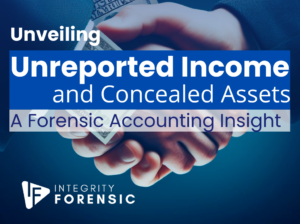Forensic accounting is an essential tool in the fight against money laundering. The complexity and subtlety of money laundering techniques require an experienced forensic accountant to uncover the details of the transactions involved. This is particularly true in cases of international money laundering, where money can move through multiple jurisdictions and financial institutions. In this blog post, we’ll explore how forensic accounting can bring clarity to money laundering investigations and increase the chances of successful prosecution.
One of the main challenges in money laundering investigations is identifying the source of the funds. Criminals go to great lengths to conceal the true origins of their ill-gotten gains, often using multiple layers of shell companies and complex transactions to muddy the waters. A forensic accountant can help unravel these layers and follow the trail of money to its source.
Forensic accountants are trained to examine financial records with a fine-tooth comb, looking for anomalies and red flags that might indicate money laundering activity. They can analyze large amounts of data to identify patterns and connections that might be missed by other investigators. By identifying unusual transactions, unexplained transfers, or discrepancies in financial statements, a forensic accountant can help build a case against suspected money launderers.
Another important role of forensic accounting in money laundering investigations is tracing the flow of funds through multiple accounts and jurisdictions. Money laundering often involves the movement of funds across borders, making it difficult to track. However, forensic accountants are skilled in using data analytics and other tools to piece together a complete picture of the financial transactions involved. This can help investigators to identify the ultimate destination of the laundered funds and to hold those responsible accountable for their actions.
In addition to tracing the flow of funds, forensic accountants can also assist in asset recovery efforts. Money laundering often involves the purchase of high-value assets, such as real estate or luxury cars, which can be used to hide the proceeds of crime. By tracking these assets and their purchase history, forensic accountants can help to identify and recover assets that have been acquired through illegal means.
In conclusion, forensic accounting is a vital component of any money laundering investigation. Its ability to bring clarity to complex financial transactions and identify the source and flow of funds is essential to prosecuting money launderers and recovering assets acquired through illegal means. By working in partnership with law enforcement agencies, forensic accountants can help to ensure that those who engage in money laundering are brought to justice.
At Integrity Forensic, we have a team of experienced forensic accountants to assist you. Call now for a free consultation: 855-673-9999 or send us a message at questions@integrityforensic.com.





